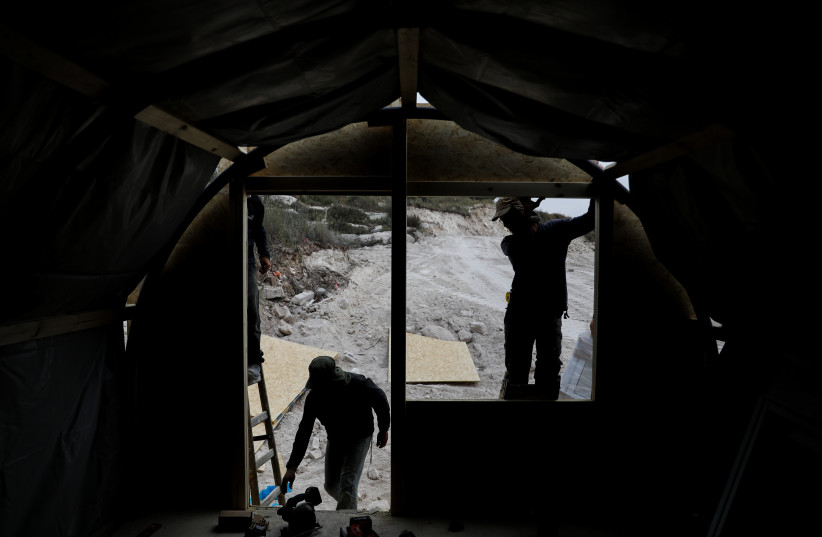Twice in the past 10 days, the US State Department has chosen to spend time, effort and hard-earned American taxpayer dollars publicly bashing Israel.
And in a world so rife with problems, with Russia attacking the Ukraine, North Korea threatening to launch ballistic missiles near Japan, and Iran advancing toward the nuclear threshold, what is it that seems to have ruffled the feathers of America’s diplomats so much? The reopening of a small yeshiva in Homesh in northern Samaria. I kid you not.
Homesh was one of four Jewish communities in Samaria that were destroyed by the Sharon government during the 2005 withdrawal from Gaza.
Recently, the Knesset passed a law revoking a previous bill that had barred Jews from setting foot on the site of the expelled communities, and the government then decided to allow Jews to reestablish a yeshiva on the ruins of Homesh.
Remarkably, this simple act of historical justice has evoked nothing less than howls of outrage from some of the foggy-headed diplomats over at Foggy Bottom.

In a statement issued on May 21, State Department Spokesman Matthew Miller said, “We are deeply troubled by the Israeli government’s order that allows its citizens to establish a permanent presence in the Homesh outpost in the northern West Bank.
“Advancing Israeli settlements in the West Bank,” he added, “is an obstacle to the achievement of a two-state solution.”
Then, on May 29, the department once again criticized the Jewish state after a building was erected for the Homesh yeshiva on Israeli state-owned land.
Over the years, we have perhaps become so accustomed to the State Department behaving toward Israel like a grouchy nanny fed up with the child in her charge that we no longer realize just how absurd, inappropriate and even hypocritical such criticism is.
Consider the following: In both of its recent statements, the State Department wordsmiths made sure to stress that they were “deeply troubled” by Israel’s actions at Homesh. Curious as to what other international events have caused America’s diplomats to be “deeply troubled,” I did a quick Google search.
It turns out that in recent months, the State Department has used the term “deeply troubled” to denounce the Nigerian Army’s alleged killing of children in a counterinsurgency operation; the barring of Cambodia’s only opposition party from participating in elections; and the release by Sudan of the murderer of a US aid worker.
In other words, in the eyes of the State Department, granting a group of Jews permission to study Torah in a yeshiva in Samaria would seem to raise the same level of concern as the murder of Nigerian children, the quashing of Cambodian democracy, and the release of an American’s killer.
Even for an institution with such a long and ignominious record of hostility toward Israel, the State Department’s condemnation of Homesh’s revival seems like, to borrow another term from diplomacy, “a disproportionate response.”
After all, by denying the right of Jews to stand, sit, study, sneeze or sleep in Homesh, the State Department is siding with anti-Jewish apartheid, essentially denouncing the presence of Jews – and only Jews – in the hills of Samaria.
Indeed, just three months ago, the Regavim organization presented photographic evidence to the Knesset Foreign Affairs and Defense Committee revealing that the Palestinians have constructed hundreds of illegal structures on the ruins of Ganim, Kadim and Sa-Nur, the three other Samaria communities that were razed along with Homesh in 2005.
Yet at no point whatsoever has the State Department uttered a peep about this brazen attempt by the Palestinians to create facts on the ground and seize control over the territory.
Apparently, it is only when Jews seek to exercise their moral, historical and human rights to live wherever they choose in their own homeland that the State Department sees fit to opine on the subject.
This brazen hypocrisy is unbefitting of an ally and defies common sense.
The State Department operates on occupied territory stolen from Native Americans
FRANKLY, BEFORE casting rhetorical stones at Israel about Judea and Samaria, the State Department might want to take a long hard look in its own backyard, which could truly be considered “occupied territory.”
The fact is that the area that is now Washington, D.C., was once home to various American Indian tribes such as the Piscataway and Nacotchtank, until they were forced to relocate by the start of the 18th century to make way for European settlers.
So every time the State Department adds a new office or engages in construction, one could argue that it is further entrenching its “occupation” of another people’s territory.
And when State Department spokesmen ascend the podium to denounce Israel for returning to the cradle of Jewish civilization, they are doing so while firmly standing on someone else’s land.
Now that, I dare say, is indeed “deeply troubling.”
The writer served as deputy communications director under Prime Minister Benjamin Netanyahu during his first term of office.
